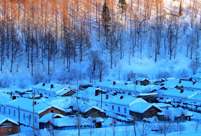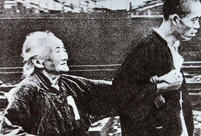 Martenitsa adds glamour to Bulgarian Embassy
Martenitsa adds glamour to Bulgarian Embassy
 Mysterious 'Dolan Tribe' in Xinjiang
Mysterious 'Dolan Tribe' in Xinjiang
 This is Shanghai
This is Shanghai
 Female attendants serving 'two sessions'
Female attendants serving 'two sessions'
 The many tears of DiCaprio
The many tears of DiCaprio
 Dan Dan's bittersweet opera life
Dan Dan's bittersweet opera life
 A dream wedding for a girl suffering from cancer
A dream wedding for a girl suffering from cancer
 Old photos of Anti-Japanese War (1937-1945)
Old photos of Anti-Japanese War (1937-1945)
 This is Beijing – Nanluoguxiang
This is Beijing – Nanluoguxiang
WASHINGTON -- The expansion of the Mongolian empire in the 1200s may have been supported by a warm and unusually wet climate that likely spurred grassland productivity, U.S. researchers studying the rings of ancient trees in mountainous central Mongolia said Monday.
Some researchers have postulated that the Mongols expanded because they were fleeing harsh weather at home, but Neil Pederson, a tree-ring scientist at Columbia University's Lamont-Doherty Earth Observatory, and his colleagues found the opposite.
Pederson and coauthor Amy Hessl, a tree-ring scientist at West Virginia University, reconstructed a 1,112-year rainfall record from 900 to 2011 using tree rings from Siberian pine trees in central Mongolia.
The record showed that exactly when the empire rose, the normally cold, arid steppes of central Asia saw their mildest, wettest weather in more than 1,000 years.
The unusual period of high moisture between 1211 and 1225 may enhance grassland productivity, providing Genghis Khan's empire with ample energy and the resources to support a culture based on horses and other livestock, the researchers said.
The record also showed that the years preceding Genghis Khan's rule were stoked by intense drought from 1180 to 1190.
"The transition from extreme drought to extreme moisture right then strongly suggests that climate played a role in human events, " said Hessl.
"It wasn't the only thing, but it must have created the ideal conditions for a charismatic leader to emerge out of the chaos, develop an army and concentrate power. Where it's arid, unusual moisture creates unusual plant productivity, and that translates into horsepower. Genghis was literally able to ride that wave," Hessl said.
Previous studies often link detrimental climate conditions such as drought with the decline of complex societies, such as the disappearance of the Maya, the fall of Roman imperial power and the 13th-century collapse of southeast Asia's Angkor civilization.
The new study, published in the U.S. journal Proceedings of the National Academy of Sciences, however, is one of the few to explore the more complex question how climate might have invigorated one.
 Chaihe village, pure and peaceful fairyland in snow
Chaihe village, pure and peaceful fairyland in snow Belgians warmly welcome arrival of China's giant pandas
Belgians warmly welcome arrival of China's giant pandas Female marines receive tactical training in NW China
Female marines receive tactical training in NW China Blood memory: Nanjing Massacre in 1937
Blood memory: Nanjing Massacre in 1937 Top 10 pure beauties in showbiz
Top 10 pure beauties in showbiz British WWII veteran: I can't forgive Japan
British WWII veteran: I can't forgive Japan Tongban's dream of prosperity
Tongban's dream of prosperity Chinese frigate Yancheng holds drills in Mediterranean Sea
Chinese frigate Yancheng holds drills in Mediterranean Sea A visit to comfort woman's home in South Korea
A visit to comfort woman's home in South Korea Fairyland? Qingdao in sea of clouds
Fairyland? Qingdao in sea of clouds Top 10 most handsome faces in Asia in 2013
Top 10 most handsome faces in Asia in 2013 Female celebs with beautiful long legs
Female celebs with beautiful long legs Cat 'guardians' in Forbidden City
Cat 'guardians' in Forbidden City Large numbers of ancient coins excavated in Inner Mongolia
Large numbers of ancient coins excavated in Inner Mongolia Leisurely life beneath Zhonggulou, where time travels slower
Leisurely life beneath Zhonggulou, where time travels slowerDay|Week|Month